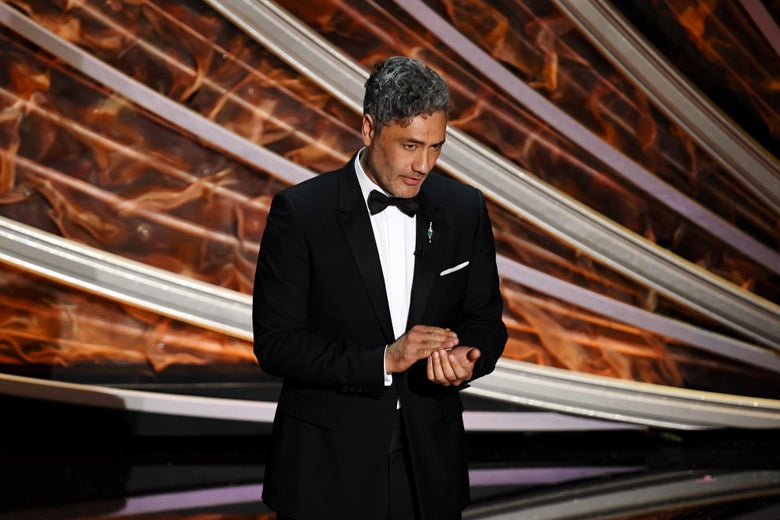
Taika Waititi speaking onstage at the 2020 Oscars.
Kevin Winter/Getty Images
It was great, obviously, when Taika Waititi won an Oscar. It was great when he said “kia ora,” the universal Māori kindness—very broadly the aloha of New Zealand—from the stage. It was great when he tucked his Oscar under the seat in front of him and when he asked the Writers Guild of America to do something about Apple laptop keyboards.
But the most important thing Taika Waititi did at Sunday’s Oscars didn’t have anything to do with his own awards. Introducing the winners of the Academy’s honorary prizes, including the great Native American actor Wes Studi, Waititi began with a quick recognition of the indigenous people upon whose land Hollywood sits on:
The Academy would like to acknowledge that tonight we have gathered on the ancestral lands of the Tongva, the Tataviam, and the Chumash. We acknowledge them as the first peoples of this land on which the motion pictures community lives and works.
On July 4, 2016, the first day of filming of Thor: Ragnarok, the cast and crew were instructed to report at 7:00 a.m. to the lot outside Stage 5 of Village Roadshow Studios on the Gold Coast of Australia. There, under a glorious winter blue sky, a group of Aboriginal dancers from the local tribe, the Bundjalung people, greeted the production in a land acknowledgment ceremony, along with a Māori celebrant who delivered a blessing in te reo Māori, the language of New Zealand’s indigenous culture. “It was Maori culture meeting with the local Aboriginal people, the true custodians of that land, coming together with all of us. It was amazing,” Chris Hemsworth recalled when I interviewed him for a 2017 profile of Waititi. “And I gave a great sigh of relief that Taika arrived with such confidence.”
Given an enormous budget for the first time on Ragnarok, Waititi, whose father is of the Te Whānau-ā-Apanui iwi, invited multiple young indigenous filmmakers to shadow experienced crew members on set for monthlong rotations. But he also knew the power of ceremony and ritual in normalizing the notion that even a massive Hollywood production required the permission of the people whose land it was using. “It’s essentially a blessing,” Waititi told me of his opening ceremony. “But that’s important to me.” Such acknowledgments are traditional in the New Zealand film industry. “Even something very small, we’d do something like that,” Waititi continued. “In America, they’d never do that. But if I came to America to make a movie, I’d make damn sure I knew who was there first.”
That kind of ceremonial acknowledgment has become more commonplace in academic settings in recent years; in film, the Toronto International Film Festival has done it before every screening for two years, and Sundance started at this year’s festival. The recognition is symbolic, of course, but it’s an extremely powerful symbol. It’s meaningful to address colonialism so overtly in an institutional context, and to have Waititi on the televisions of millions of people around the world saying those words will hopefully resonate for a long time.
Was the declaration an impromptu move by Waititi? I noticed he carefully phrased his statement in such a way to attest to the Academy’s support of the sentiment. Perhaps they agreed to his request, or perhaps he’s cleverly made it impossible for them not to support it after the fact. I’m very curious if we’ll hear such acknowledgments in years when a Māori guy doesn’t win an award. I hope so. I, too, want Apple to fix their keyboards, but I want these kinds of subtle but crucial changes in attitude even more.
Readers like you make our work possible. Help us continue to provide the reporting, commentary and criticism you won’t find anywhere else.
Join Slate Plusfrom Slate Magazine https://ift.tt/3bsVHqP
via IFTTT
沒有留言:
張貼留言